Sonia Gandhi
| Sonia Gandhi | |
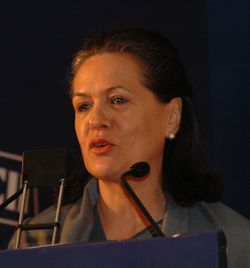 |
|
|
|
|
| Incumbent | |
| Assumed office 2004 |
|
|
|
|
| Incumbent | |
| Assumed office 1998 |
|
|
Member of the Lok Sabha for Rae Bareilly, Uttar Pradesh
|
|
| Incumbent | |
| Assumed office 2006 |
|
| In office 2004 – 23 March 2006 |
|
|
Leader of the Opposition
|
|
| In office 19 March 1998 – 22 May 2004 |
|
| Succeeded by | Lal Krishna Advani |
|---|---|
|
Member of the Lok Sabha for Amethi, Uttar Pradesh
|
|
| In office 1999–2004 |
|
|
|
|
| Born | 9 December 1946 Orbassano, Piemonte, Italy |
| Citizenship | Indian |
| Nationality | Indian |
| Political party | Indian National Congress |
| Spouse(s) | Rajiv Gandhi (m. 1969–1991) |
| Children | Rahul Gandhi Priyanka Gandhi |
| Residence | 10 Janpath, New Delhi, India |
| Profession | Political Social Worker |
Sonia Gandhi (Hindi: सोनिया गांधी; born Edvige Antonia Albina Maino[1][2] (born on 9 December 1946) is an Italian-born Indian politician. She is currently the President of the Indian National Congress Party, Chairperson of the ruling United Progressive Alliance in the Lok Sabha and the leader of the Congress Parliamentary Party. She is the longest serving president the of the Congress party.[3]
Gandhi was named the third most powerful woman in the world by Forbes magazine in the year 2004[4] and was ranked 6th in 2007.[5] She was also named among the Time 100 most influential people in the world for the years 2007[6] and 2008.[7]
Contents |
Early life
She was born to Stefano and Paola Maino in contrà Màini, not far from Lusiana, a little village 30 km from Vicenza in the region of Veneto, Italy. She spent her adolescence in Orbassano, a town near Turin, being raised in a traditional Roman Catholic family and attending a Catholic school. Her father, a building contractor, died in 1983.[8] Her mother and two sisters still live around Orbassano.[9]
In 1964, she went to study English at the Bell Educational Trust's language school in the city of Cambridge. She met Rajiv Gandhi, who was enrolled in Trinity College at the University of Cambridge in 1965 at a Greek restaurant.[10] Sonia and Rajiv Gandhi married in 1968, following which she moved into the house of her mother-in-law and then Prime Minister, Indira Gandhi.[11]
The couple had two children, Rahul Gandhi (born 1970) and Priyanka Gandhi (born 1972). Despite belonging to the influential Nehru family, Sonia and Rajiv avoided all involvement in politics. Rajiv worked as an airline pilot while Sonia took care of her family.[12] When Indira was ousted from office in 1977 in the aftermath of the Indian Emergency, the Rajiv family moved abroad for a short time. When Rajiv entered politics in 1982 after the death of his younger brother Sanjay Gandhi in a plane crash on 23 June 1980, Sonia continued to focus on her family and avoided all contact with the public.[13]
Political career
Wife of the Prime Minister
Sonia Gandhi's involvement with Indian public life began after the assassination of her mother-in-law and her husband's election as Prime Minister. As the Prime Minister's wife she acted as his official hostess and also accompanied him on a number of state visits. In 1984, she actively campaigned against her husband's sister-in-law Maneka Gandhi who was running against Rajiv in Amethi. At the end of Rajiv Gandhi's five years in office, the Bofors Scandal broke out. Ottavio Quattrocchi an Italian business man believed to be involved, was said to be a friend of Sonia Gandhi, having access to the Prime Minister's official residence.[14]
Congress President
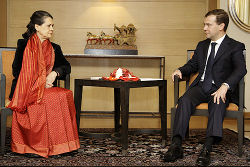
After the assassination of her husband Rajiv Gandhi and her refusal of becoming Prime Minister, the party settled on the choice of P. V. Narasimha Rao who became leader and subsequently Prime Minister. Over the next few years, however, the Congress fortunes continued to dwindle and it lost the 1996 elections. Several senior leaders such as Madhavrao Sindhia, Rajesh Pilot, Narayan Dutt Tiwari, Arjun Singh, Mamata Banerjee, G. K. Moopanar, P. Chidambaram, Jayanthi Natarajan were in open revolt against the incumbent President Sitaram Kesri and quit the party, splitting the Congress into many factions.
In an effort to revive the party's sagging fortunes, she joined the Congress Party as a primary member in the Calcutta Plenary Session in 1997 and became party leader in 1998[15].
Within 62 days of joining of a primary member, she was offered the party President post which she accepted. She contested Lok Sabha elections from Bellary, Karnataka and Amethi, Uttar Pradesh in 1999. In Bellary she defeated veteran BJP leader, Sushma Swaraj. In 2004 and 2009, she was re-elected to the Lok Sabha from Rae Bareli in Uttar Pradesh.
Leader of the Opposition
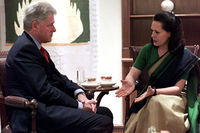
She was elected the Leader of the Opposition of the 13th Lok Sabha in 1999.
When the BJP-led NDA formed a government under Atal Bihari Vajpayee, she took on the office of the Leader of Opposition. As Leader of Opposition, she called a no-confidence motion against the NDA government led by Vajpayee in 2003.
She holds the record of having served as Congress President for 10 years consecutively.
2004 elections and aftermath
In the 2004 general elections, Gandhi launched a nationwide campaign, criss-crossing the country on the Aam Aadmi (ordinary man) slogan in contrast to the 'India Shining' slogan of the BJP-led National Democratic Alliance (NDA) alliance. She countered the BJP asking "Who is India Shining for?" In the election, she won by a large margin in the Rae Bareilly constituency in Uttar Pradesh. Following the unexpected defeat of the NDA, she was widely expected to be the next Prime Minister of India. On 16 May, she was unanimously chosen to lead a 15-party coalition government with the support of the left, which was subsequently named the United Progressive Alliance (UPA).
After the election result, the defeated NDA protested once against her 'foreign origin' and senior NDA leader Sushma Swaraj threatened to shave her head and "sleep on the ground", among other things, should Sonia become prime minister [16]. The NDA also claimed that there were legal reasons that barred her from the Prime Minister's post.[17] They pointed, in particular, to Section 5 of the Indian Citizenship Act of 1955, which they claimed implied 'reciprocity'. This was contested by others[18] and eventually the suits were dismissed by the Supreme Court of India.
A few days after the election, Gandhi appointed Manmohan Singh as prime minister. Her supporters compared it to the old Indian tradition of renunciation[19], while her opponents attacked it as a political stunt.[20].
UPA Chairperson
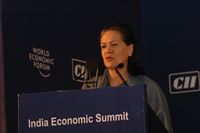
On 18 May, she recommended noted economist Dr. Manmohan Singh for the Prime Minister's post.
On 23 March 2006, Gandhi announced her resignation from the Lok Sabha and also as chairperson of the National Advisory Council under the office-of-profit controversy and the speculation that the government was planning to bring an ordinance to exempt the post of chairperson of National Advisory Council from the purview of office of profit. She was re-elected from her constituency Rae Bareilly in May 2006 by a huge margin of over 400,000 votes.
As chairperson of the National Advisory Committee and the UPA chairperson, she played an important role in making the National Rural Employment Guarantee Scheme and the Right to Information Act into law.[21][22]
She addressed the United Nations on 2 October 2007, Mahatma Gandhi's birth anniversary which is observed as the international day of non-violence after a UN resolution passed on 15 July 2007.[23]
Under her leadership, India returned the Congress-led-UPA to a near majority in the 2009 general elections with Manmohan Singh as the Prime Minister. The Congress itself won 206 Lok Sabha seats, which was the highest total by any party since 1991.
Austerity drive
Sonia Gandhi advocated austerity for all the congress MPs and set an example by travelling in economy class on her 14 September 2009 travel from New Delhi to Mumbai. She saved Rs 10,000.[24][25] She also advocated for contribution of 20% of MPs salary (An MPs monthly salary is Rs 16,000) for the drought affected victims in India.
Personal life
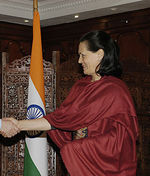
Sonia is the widow of the late Rajiv Gandhi, elder son of Indira Gandhi. Her son, Rahul Gandhi, was elected to Parliament from the Amethi constituency (UP) in 2004. Her daughter Priyanka Gandhi has not stood for office, though she has worked as a Congress campaign manager. There has been considerable media speculation about their future in the Congress.
Controversies
1980s voting registration
In 1980 her name appeared in the voter's list for New Delhi prior to her becoming an Indian Citizen. At the time she was still holding Italian Citizenship.[26] A violation of Form 4 of the Registration of Electors Rules, 1960, which states that "Only the names of those who are citizens of India should be entered on the electoral rolls."[27] When she did acquire Indian Citizenship, in April 1983, the same issue cropped up again, as her name appeared on the 1983 voter's list when the deadline for registering had been in January 1983.[28][29]
Swiss accounts
Swiss magazine Schweizer Illustrierte in 1991 claimed that she was controlling accounts worth $2 billion dollars in her minor son's name.[30][31]
Harvard scholar Yevgenia Albats cited KGB correspondence about payments to Rajiv Gandhi and his family, which had been arranged by Viktor Chebrikov,[32] which shows that KGB chief Viktor Chebrikov sought in writing an "authorization to make payments in U.S. dollars to the family members of Rajiv Gandhi, namely Sonia Gandhi, Rahul Gandhi and Paola Maino, mother of Sonia Gandhi" from the CPSU in December 1985. Payments were authorized by a resolution, CPSU/CC/No 11228/3 dated 20 December 1985; and endorsed by the USSR Council of Ministers in Directive No 2633/Rs dated 20 December 1985. These payments had been coming since 1971, as payments received by Sonia Gandhi's family and "have been audited in CPSU/CC resolution No 11187/22 OP dated 10/12/1984.[33] In 1992 the media confronted the Russian government with the Albats disclosure. The Russian government confirmed the veracity of the disclosure and defended it as necessary for "Soviet ideological interest."[32]
In 2008 her party appointed Prime Minister Manmohan Singh. Singh was the only international leader to initially refuse data provided by the German authorities during 2008 Liechtenstein tax affair.[34][35] However, the Germans had no information on any Indian politician's accounts.,[36] although after 17 years of investigation by a Janata Dal and United Front and National Front and a BJP government, there has been no evidence to link Rahul Gandhi or Sonia Gandhi to the Swiss accounts.
All this was in the wake of the 2006 Swiss Banking Association report.
Foreign birth
Gandhi's foreign birth has sparked intense debate and opposition.[16][37][38] Although Sonia Gandhi is actually the fifth foreign-born person to be leader of the Congress Party, she is the first since independence in 1947.[39]
Early in her leadership, there was even criticism from within the Congress Party. In May 1999, three senior leaders of the party (Sharad Pawar, Purno A. Sangma, and Tariq Anwar) challenged her right to try to become India's Prime Minister because of her foreign origins. In response, she offered to resign as party leader, resulting in an outpouring of support and the expulsion from the party of the three rebels who would go on to form the Nationalist Congress Party.[40]
A senior Congress leader Pranab Mukherjee said that she surrendered her Italian passport to the Italian Embassy 27 April 1983. Yet surrendering a passport does not amount to the loss of citizenship as commented by President of Janata Party.[29][41][42] However, Italian nationality law did not permit dual nationality until 1992. So by acquiring Indian citizenship in 1983 she would automatically have lost Italian citizenship.[43]
The Italian citizenship law of 1992 did open a window of opportunity for those who lost their citizenship prior to 1992 to re-register as Italian citizens until the deadline of 31 December 1997.[44]. Sonia Gandhi has neither confirmed nor denied that she took advantage of this opportunity. At present the Government of India does not allow dual citizenship.[45]
Notes
- ↑ Sonia Gandhi - Britannica
- ↑ Divided we stand: India in a time of coalitions. Los Angeles : SAGE Publications, 2007.. 2007. pp. 148. ISBN 978-0761936633.
- ↑ Fourth time in a row, Sonia Gandhi is Congress chief
- ↑ Sonia Gandhi 3rd most powerful woman. Retrieved on 23 March 2007.
- ↑ Sonia Gandhi in Forbes' list for 2007 Retrieved on 31 August 2007
- ↑ Sonia Gandhi among Time's 100 for 2007. Retrieved on 14 May 2007
- ↑ Sonia Gandhi among Time's 100 for 2008. Retrieved on 1 May 2008.
- ↑ In Maino land. Retrieved on 23 March 2007.
- ↑ Italy heralds 'first woman PM'. Retrieved on 18 July 2007.
- ↑ "The Sonia Shock". Time. 17 May 2004. http://www.time.com/time/asia/covers/501040524/story.html. Retrieved 2009-06-12.
- ↑ The name game of the rich and famous. Retrieved on 18 July 2007.
- ↑ BREAKING THE SILENCE Retrieved on 20 July 2007.
- ↑ Sonia Gandhi, pressured congress, to return as Congress Party's Leader
- ↑ Who is Quattrocchi? Retrieved on 23 March 2007.
- ↑ Sonia Gandhi, Indian National Congress Party Chairman
- ↑ 16.0 16.1 Religioscope: India: politics of renunciation, traditional and modern - Analysis
- ↑ Pioneer News Servic. "Whose inner voice?". CMYK Multimedia Pvt. Ltd. http://www.dailypioneer.com/indexn12.asp?main_variable=VOTE_2004&file_name=vote941.txt&counter_img=941. Retrieved 2007-07-20.
- ↑ Venkatesan, V (June 1999). "Citizen Sonia". Frontline 16 (12). http://www.hinduonnet.com/fline/fl1612/16120300.htm. Retrieved 2007-07-20.
- ↑ BBC NEWS (2004-05-19). "Indian press lauds Gandhi decision". BBC. http://news.bbc.co.uk/1/hi/world/south_asia/3727591.stm. Retrieved 2008-02-06.
- ↑ BBC NEWS (2006-03-23). "Profile: Sonia Gandhi". BBC. http://news.bbc.co.uk/1/hi/world/south_asia/3546851.stm. Retrieved 2008-07-06.
- ↑ Employment Bill not a populist measure: Sonia. Retrieved on 13 July 2007.
- ↑ After RTI success, it's right to work. Retrieved on 13 July 2007.
- ↑ "Sonia Gandhi raises disarmament issue at UN meet". The Times of India. http://timesofindia.indiatimes.com/Sonia_raises_disarmament_issue_at_UN_meet/articleshow/2422950.cms. Retrieved 2007-10-02.
- ↑ "Sonia leads by example, flies economy to Mumbai". CNN-IBN. 14 September 2009. http://ibnlive.in.com/news/sonia-leads-by-example-to-fly-economy-to-mumbai/101327-37.html. Retrieved 31 January 2010.
- ↑ "Why austerity? Coz you need money to keep some people poor". MSN. 15 September 2009. http://news.in.msn.com/national/article.aspx?cp-documentid=3226867. Retrieved 31 January 2010.
- ↑ "Sonia's candidature challenged in Madras high court". Rediff.com. 25 August 1999. http://www.rediff.com/election/1999/aug/25sonia.htm. Retrieved 31 January 2010.
- ↑ "BJP accuses Sonia of flouting law". The Indian Express. 12 May 1999. http://www.indianexpress.com/res/web/pIe/ie/daily/19990512/ipo12039.html. Retrieved 31 January 2010.
- ↑ "Elevenses". Rediff.com. 13 May 1999. http://www.rediff.com/news/1999/may/13varsha.htm. Retrieved 31 January 2010.
- ↑ 29.0 29.1 "Citizen Sonia". Frontline Magazine. 5–18 June 1999. http://www.hinduonnet.com/fline/fl1612/16120300.htm. Retrieved 31 January 2010.
- ↑ http://www.zeenews.com/news528156.html
- ↑ http://www.americanthinker.com/2005/09/sonia_gandhis_reluctant_war_on_1.html
- ↑ 32.0 32.1 Can Corrupt Politicians Preserve Freedom?
- ↑ Albats. KGB: The State Within a State. Translated from the Russian by Catherine A. Fitzpatrick. 1995. ISBN 1850439958, ISBN 9781850439950. First edition in 1994, ISBN 0374527385, ISBN 9780374527389.
- ↑ http://timesofindia.indiatimes.com/articleshow/msid-3057422,prtpage-1.cms
- ↑ http://economictimes.indiatimes.com/articleshow/3058947.cms
- ↑ http://www.asianage.com/presentation/columnisthome/paranjoy-guha-thakurta/why-indians-stash-money-abroad.aspx
- ↑ "BJP sees Gujarat ammo in Sonia origins". The Telegraph. 30 August 2002. http://www.telegraphindia.com/1020830/asp/nation/story_1151052.asp. Retrieved 2 February 2010.
- ↑ "Uma Bharti does not want to be CM". Rediff.com. 18 May 2004. http://www.rediff.com/election/2004/may/18uma.htm. Retrieved 2 February 2010.
- ↑ "On being foreign and being nationalist". Frontline Magazine. 22 May-4 June 1999. http://www.hindu.com/fline/fl1611/16110920.htm. Retrieved 2 February 2010.
- ↑ "India's Congress Party rallies for Sonia Gandhi". CNN. 17 May 1999. http://www.cnn.com/WORLD/asiapcf/9905/17/india.gandhi.01/index.html. Retrieved 2 February 2010.
- ↑ "Sonia gave up Italian passport 16 yrs ago, says Congress". The Indian Express. 24 May 1999. http://www.indianexpress.com/res/web/pIe/ie/daily/19990524/ipo24068.html. Retrieved 2 February 2010.
- ↑ "A citizenship question". Frontline Magazine. 29 September-12 October 2001. http://www.hinduonnet.com/fline/fl1820/18200340.htm. Retrieved 2 February 2010.
- ↑ "Citizenship: How to lose it?". Trentini Nel Mondo. http://www.trentininelmondo.it/cittadinanza/come_si_perde_en.asp. Retrieved 2 February 2010.
- ↑ http://www.consmelbourne.esteri.it/Consolato_Melbourne/Menu/I_Servizi/Per_i_cittadini/Cittadinanza/
- ↑ http://newdelhi.usembassy.gov/acsdualnation.html
See also
- Political Families of The World
- List of Italians
References
- S. R. ET AL. BAKSHI (1998) Sonia Gandhi, The President of AICC South Asia Books. ISBN 81-7024-988-0
- Rupa Chaterjee (1999) Sonia Gandhi: The Lady in Shadow Butala. ISBN 81-87277-02-5
- C. Rupa, Rupa Chaterjee (2000) Sonia Mystique South Asia Books. ISBN 81-85870-24-1
- Moro, Javier "El sari rojo" (Ed. Seix Barral, 2008) "Il sari rosso" (Il Saggiatore, 2009)
External links
- Official websites
- Others
- Profile by BBC News dated 23 March 2006
- Profile at Govt. of India website
- QRZ Ham Radio Callsign Database - VU2SON
- Rajiv Gandhi Memorial SEANET Convention
- Sonia Gandhi
|
|||||||||||||||||